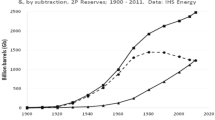Abstract
Fossil fuels are finite and nonrenewable. In due course, they will become scarce and costly. Their role in powering modern economies is so vital as to warrant a review of ultimately recoverable reserves and of plausible future consumption patterns. Over the past 50 years, many oil companies, geologists, governments, and private corporations have performed scores of studies of Estimated Ultimately Recoverable (EUR) global oil. Taken together, the great majority of these studies reflect a consensus that EUR oil reserves lie within the range of 1800 to 2200 billion barrels. Given this range, a simple model is used to calculate that world oil production is likely to peak sometime between 2007 and 2019. The global transportation sector, almost totally dependent on oil, could be especially hard hit unless vehicles fueled by sources other than petroleum are developed and rapidly deployed.
Similar content being viewed by others
References
Adams, T., 1981, World oil reserves, charting the future: Middle East Well Evaluation Review, November 10.
Energy Information Administration, 1995, World Energy Outlook 1995, U.S. Department of Energy, DOE/EIA-0494 (95), p. 18.
Hubbert, M. K., 1956, Nuclear Energy and the Fossil Fuels: Publication No. 95, Shell Development Company. Houston, TX.
International Energy Agency, 1995, World Energy Outlook, 1995, p. 29.2.
Ivanhoe, L.F., 1995, Future world oil supplies: There is a finite limit: World Oil, October 1995, p. 77–88.
Ivanhoe, L. F. and Leckie, G.G., 1993, Global oil, gas fields, sizes tallied, analyzed Oil & Gas Journal, v. 91, p. 87–91.
Jenkins, D. A. L., 1987, World oil reserves and supply: Unpublished manuscript, prepared for the Conference on Oil Supply and Price, Institute of Petroleum, November.
Laherrere, J., 1995, World oil reserves, which numbers to believe: OPEC Bulletin, February.
Masters, C. D., Attanasi, E. D., and Root, D. H., 1994, World petroelum assessment and analysis,in Proceedings of the Fourteenth World Petroleum Congress, v. 2. p. 529–541.
Masters, C. D., Root, D. H., and Attanasi, E. D., 1991, Resource constraints in petroleum production potential: Science, v. 253, p. 146–152.
Miremadi, A. and Ismail, I. A. H., 1993, Middle East due even greater role in worldwide oil supply: Oil & Gas Journal, v. 91, p. 61–71.
Shell International Petroleum Company, Ltd., 1994, Upstream essentials: Shell Briefing Service, No. 4.
Woodward, David, 1993, 2020 Vision, a look at the oil industry in the 21st century: Middle East Well Evaluation Review, November 14.
Author information
Authors and Affiliations
Additional information
This paper is based in part on a World Resources Institute report by the author entitled “Oil as a finite resource when is global production likely to peak?” The full report is available from WRI’s web site (http://www.wri.org/wri), or from WRI directly: WRI, 1709 New York Avenue, NW, Washington, D.C. 20006.
Rights and permissions
About this article
Cite this article
MacKenzie, J.J. Oil as a finite resource. Nat Resour Res 7, 97–100 (1998). https://doi.org/10.1007/BF02767703
Received:
Accepted:
Issue Date:
DOI: https://doi.org/10.1007/BF02767703




